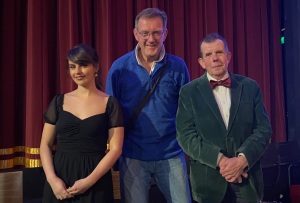(This item first appeared in the Brighton Argus on 13th March 2024)
Brighton has a poor record of preserving the memory of those who have gone before. How many Brightonians, not least those who are recent arrivals, know who Herbert Carden, Dorothy Stringer or Lewis Cohen were? And why should they? The City Council does little to commemorate these and other individuals who helped make the city what it is. The Argus remembers them, and Brighton and Hove Buses names significant people from Brighton’s past on its buses and on a special website. It should be commended for this.
From time to time I write about people I have known who have died, people like Selma Montford, Dennis Hobden, Ruth Larkin, Bernie Jordan and Bob Cristofili. Mary Clarke is the ‘forgotten suffragette’ in spite of being Emmeline Pankhurst’s sister. Mary ran the Brighton office of the Women’s Social and Political Union. She died on Christmas Day 1910 from a brain haemorrhage probably caused by rough treatment at the hands of the police and prison authorities immediately before her passing. There is no memorial for Mary other than her name appearing on the front of a Brighton bus. There is now a campaign to have a statue of Mary Clarke erected in the gardens of the Royal Pavilion estate.
Another long-forgotten Brightonian is Mercedes Gleitze. She was born in Brighton who, in 1927, became the first British woman to swim the English Channel. Her swimming achievements were not ‘limited’ to that. She is believed to be the first person to swim the Straights of Gibraltar and was the first person to swim to Robben Island and back to Cape Town, a sea I know well as I was brought up there and can testify to the currents and coldness of those waters.
After nearly 100 years during which time she had become largely forgotten, her legacy is now secure through a film that went on general release last Friday, deliberately coinciding with International Women’s Day. The film, Vindication Swim, features the amazing Kirsten Callaghan and the equally impressive John Locke. Remarkably, it was written and directed by a 23-year-old Brightonian, Elliott Hasler. If you warch just one film this year, make sure it’s Vindication Swim.
After a special screening of the film on International Women’s Day at Brighton’s Duke of York cinema, a cinema that Mercedes herself had visited, Kirsten Callaghan, John Locke and Elliott Hasler answered questions from the audience. Kirsten described some of the discomforts and challenges faced by Mercedes which she, too, had experienced. For example, she wore a heavy 100-year-old one-piece bathing suit. The leather in the goggles she used bled, resulting in a disgusting taste seeping into her mouth. On one occasion she was in the water for four hours, with the salt affecting her mouth and sense of taste. Elliott, too, spent lengthy periods filming in the water, but he had the protection of a wetsuit! John, on the other hand, stayed in a small support boat as had his character, Harold Best, who had coached Mercedes.
All the scenes in the sea were filmed off the south coast. No use was made of stage tanks nor ‘green screen’ technology where subjects can be superimposed onto virtual backgrounds.
Back to Mercedes herself. Her first endurance swimming record was for 26 hours. Over several years she extended this record to 45 and, subsequently, 46 hours. She had become a popular and famous personality, and when she undertook these endurance swims in public swimming baths, crowds would attend and encourage her by singing together.
Most of Mercedes epic swims, including her world records for endurance swimming, were sponsored. She used her sponsorship and winnings to open accommodation for homeless people, particularly homeless women, with the first Mercedes Gleitze Home opening in Leicester in 1933. The charity bearing her name continues to operate providing accommodation for homeless people but, sadly, not in Brighton. She helped unemployed people to move from the north to Leicester where there were jobs. She is also said to have supported the extension of the franchise to women below the age of 30 in 1928.
Towards the end of her life, Mercedes became increasingly reclusive. She denied her past achievements and would not discuss them with her family. She died in1981 in London aged 80. There is now a blue plaque commemorating this daughter of Brighton at the house in Freshfield Road where she was born in 1900.
I hope that in future more Brighton women, perhaps not as exceptional as Mercedes Gleitze, can be remembered for their own extraordinary achievements.






